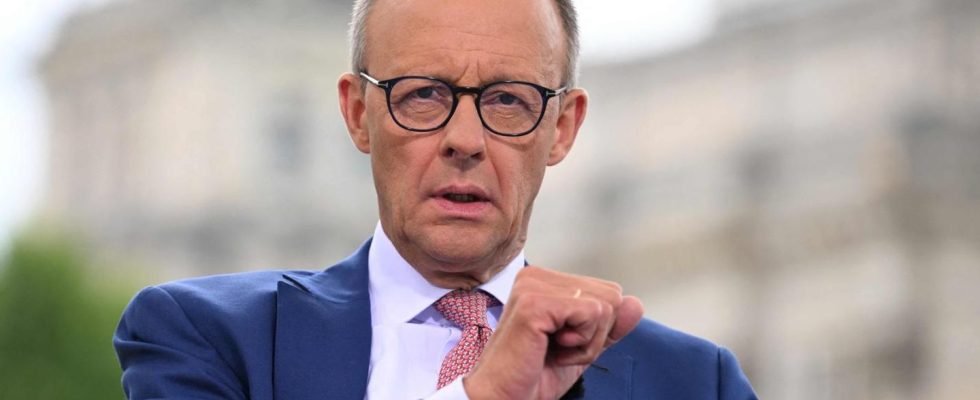ARD summer interview
“A no is a no”: Merz categorically excludes cooperation with the AfD
CDU leader Friedrich in the ARD summer interview: “We have to secure the freedom of our country”
© John MacDougall / AFP
Friedrich Merz categorically ruled out any cooperation between the CDU and the AFD and thus straightened out irritating statements a few weeks earlier. The CDU boss also commented on the condition of the traffic lights and the heating law.
CDU leader Friedrich Merz gave a summer interview to ARD and made extensive statements on many topics. For possible collaboration with He also made statements for the AfD and ruled out any collaboration between his party at all political levels. “We have a clear decision-making position in the CDU. We don’t work with the AfD. Not in the parliaments, not in the local councils,” said Merz on Sunday in the ARD “summer interview” in Berlin. When asked by the head of the capital’s office, Tina Hassel, whether this also applies to the municipal level, he added: “A no is a no. (…) Also at the municipal level.”
In July, Merz did not sound quite so clear in an interview with ZDF. Nevertheless defended his statements at that time. The word cooperation was not mentioned at all in a ZDF interview, he said. “I have referred to the election results and there is nothing to add.” Merz’s statements on how to deal with the AfD in municipalities were often interpreted as softening the demarcation between the CDU and right-wing populists. Merz had vehemently contradicted that at the time. There was also a lot of criticism from our own ranks.
Friedrich Merz is skeptical about a possible AfD ban
In the ZDF interview, Merz explained that if the AfD elected a district administrator in Thuringia and a mayor in Saxony-Anhalt, then these were democratic elections. “We have to accept that. And of course the local parliaments have to look for ways to shape the city or the district together.”
In the ARD, Merz now emphasized that this comment did not refer to the CDU alone. This is “a challenge for all parties. That includes the SPD, the Greens, the FDP, if there are free voters, they too. We have to look for ways and we will find these ways too.” There are “majorities in all parliaments in Germany, in all, including all local councils, without the AfD”. The Union faction leader added: “A right thing does not become wrong because it is said by the wrong people. We make our policy according to our convictions and that says everything.”
At the same time, Merz was again opposed to an AfD ban. “Party bans have seldom had any effect in the Federal Republic of Germany. The people who are on the wrong political path are still there. I think very little of that.” The AfD is classified and observed by the Office for the Protection of the Constitution as a suspected right-wing extremist.
When it comes to the K question, Merz is cautious
In the explosive K-question, Merz was cautious. He left open whether the Union should choose its chancellor candidate before or after the state elections in late summer 2024. After the Hessian Prime Minister Boris Rhein (CDU) followed the proposal by CSU leader Markus Söder to clarify the candidate for chancellor only after the state elections in three eastern German states in September 2024, Merz said on ARD: “That can be a good argument “I know that the East German state associations sometimes see things differently. We decide that together and not publicly.”
Merz accused the traffic light coalition of burdening the country with too much bureaucracy and too many specifications: “We have to secure the freedom of our country and we have to maintain the prosperity of our country,” said Merz. “The first thing is that we have to stop this insane bureaucracy in this country and, if possible, push it back.” Neither the heating law planned by the coalition nor the cannabis law should be passed. In general, all laws would have to be checked “as to what they trigger in terms of bureaucracy.
Furthermore, it is about lowering energy prices, “particularly through the taxes and duties that the state raises.” It makes no sense to subsidize energy and at the same time levy high taxes on it.
Criticism of basic child security
Last but not least, Merz named the government’s climate policy as a major challenge. “We have to understand climate policy, energy policy and economic policy as a unit,” he said.
Merz was critical of the planned basic child security, which is currently causing controversy in the coalition. “We see the problems,” he said. There are too many children at risk of poverty in the country and these children must be helped. However: “We are firmly convinced that more money for parents is not always the right solution.” Better would be more support for the children, better educational facilities and better care facilities.
From 2025, basic child security is intended to bundle the state’s financial services and thus make them more accessible. A guaranteed amount is planned for all children. There is also an additional amount that depends on the income of the family. The government is still arguing about funding for the project.

